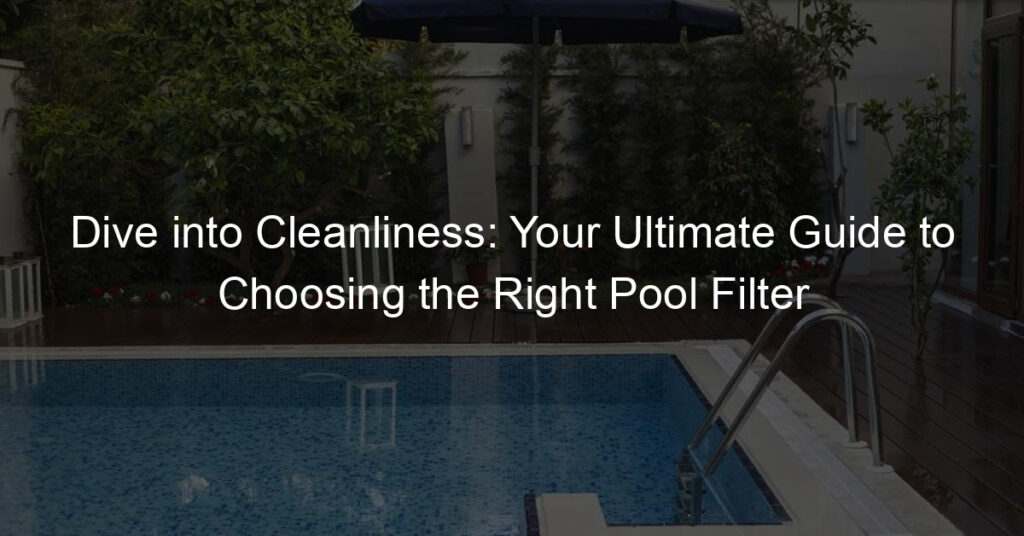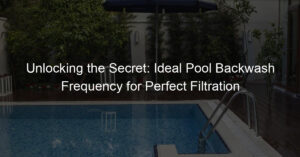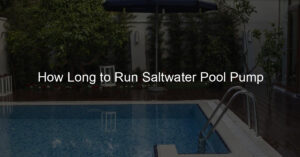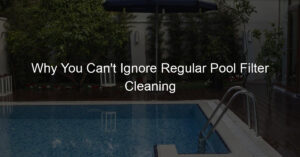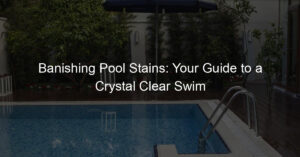Introduction to Pool Maintenance
Keeping a swimming pool clean and safe is a crucial task for any pool owner. It’s not just about keeping the water sparkling; it’s also about ensuring the health and safety of everyone who uses the pool. In this article, we’ll explore the importance of regular pool maintenance and the role of pool filters in maintaining cleanliness.
- Importance of Regular Pool Maintenance
- Role of Pool Filters in Maintaining Cleanliness
Regular pool maintenance is essential for several reasons. Firstly, it helps keep the water clear and free of harmful bacteria and algae. A well-maintained pool is also more enjoyable to swim in. No one wants to swim in a pool with dirty, cloudy water!
Secondly, regular maintenance can extend the life of your pool and its equipment. By regularly checking and adjusting the chemical balance of your pool, you can prevent damage to the pool’s lining and equipment. This can save you money in the long run.
Lastly, regular pool maintenance can help you spot problems early before they become major issues. For example, if you notice a small leak during your regular maintenance routine, you can fix it before it becomes a bigger, more expensive problem.
Pool filters play a crucial role in maintaining the cleanliness of your pool. They work by removing dirt, debris, and other impurities from the water. This not only helps keep the water clear but also prevents the growth of bacteria and algae.
There are several types of pool filters, including sand filters, cartridge filters, and diatomaceous earth (DE) filters. Each type has its pros and cons, and the best one for you will depend on your specific needs and circumstances.
Regardless of the type of filter you have, it’s important to clean and maintain it regularly. A dirty or poorly maintained filter won’t be able to effectively clean your pool, which can lead to cloudy water and the growth of bacteria and algae.
In the following sections, we’ll delve deeper into the world of pool filters, including how to choose the right one for your pool and how to maintain it properly. So, stay tuned!
Comprehensive Pool Filter Guide: Understanding the Basics
When it comes to maintaining a swimming pool, the pool filter plays a crucial role. Let’s dive into the basics of what a pool filter is and why it’s so essential.
- What is a Pool Filter?
- Why is a Pool Filter Essential?
A pool filter is a vital piece of equipment for any swimming pool. It’s like the pool’s kidney! Just as kidneys in our bodies filter out impurities, a pool filter does the same for swimming pool water. It removes dirt, leaves, and other debris, leaving the water clean and clear. There are different types of pool filters, but they all serve this primary function.
A pool filter is essential for several reasons. First, it keeps the water clean and clear, which is not just about looking good – it’s about safety too. Dirty water can be a breeding ground for bacteria and other harmful organisms. Second, a pool filter helps to maintain the chemical balance of the water. Without a properly functioning filter, you might find yourself needing to use more chemicals to keep the water safe. This can be costly and bad for the environment. Finally, a pool filter can help to extend the life of your pool by preventing damage caused by debris.
In conclusion, a pool filter is a critical component of any swimming pool. It keeps the water clean and safe, helps to maintain the chemical balance, and can even extend the life of your pool. So, when it comes to pool maintenance, don’t overlook the importance of the pool filter!
Choosing the Right Pool Filter: Factors to Consider
When it comes to maintaining a clean and healthy swimming pool, choosing the right filter is crucial. The filter is the heart of your pool’s circulation system, keeping the water clean and clear. However, not all pool filters are created equal. Here are some key factors to consider when selecting the right pool filter for your needs.
- Size of Your Pool
- Type of Debris Commonly Found in Your Pool
- Frequency of Pool Usage
The size of your pool is a major factor in choosing the right filter. Larger pools require more powerful filters to efficiently clean the water. For instance, a small above-ground pool might do well with a cartridge filter, while a large in-ground pool might require a sand or diatomaceous earth (DE) filter. Always check the filter’s specifications to ensure it’s suitable for your pool’s size.
The type of debris your pool commonly collects can also influence your filter choice. If your pool is surrounded by trees or plants, it’s likely to collect more leaves and organic debris, requiring a filter with a larger debris capacity like a sand filter. On the other hand, if your pool mostly collects fine dust or sand, a DE or cartridge filter might be a better choice as they can filter out smaller particles.
How often your pool is used can also affect the type of filter you need. If your pool is used frequently, it will require more filtration to keep the water clean. A high-capacity filter like a sand or DE filter might be necessary. Conversely, if your pool is used less frequently, a cartridge filter might suffice. Remember, more usage means more contaminants, so choose a filter that can handle the load.
In conclusion, the size of your pool, the type of debris it commonly collects, and the frequency of pool usage are all important factors to consider when choosing the right pool filter. By taking these factors into account, you can ensure that you select a filter that will keep your pool clean and clear, providing a safe and enjoyable swimming environment for everyone.
Swimming Pool Filter Selection: Types of Pool Filters
Choosing the right filter for your swimming pool is crucial in maintaining clean and safe water for swimming. There are three main types of pool filters that you can choose from, each with its own unique features and benefits. Let’s take a closer look at each type.
- Sand Filters
- Cartridge Filters
- Diatomaceous Earth Filters
Sand filters are one of the most popular types of pool filters. They work by pushing the pool water through a bed of sand. As the water passes through, the sand traps and holds onto the dirt and debris. Over time, the sand will become dirty and will need to be replaced. This type of filter is easy to use and maintain, making it a great choice for pool owners who want a simple and effective solution.
Cartridge filters use a paper-like material to filter out dirt and debris from the pool water. They have a larger surface area than sand filters, which means they can catch more dirt and debris. Cartridge filters are easy to clean – you simply remove the cartridge and rinse it off. They are also more energy-efficient than sand filters, making them a good choice for those who want to save on their energy bills.
Diatomaceous Earth (DE) filters offer the highest level of filtration, removing particles as small as 5 microns. DE filters use a fine powder made from fossilized remains of diatoms, a type of hard-shelled algae. This powder coats a series of grids inside the filter, and as water passes through, the DE captures and holds onto the dirt and debris. DE filters require more maintenance than sand or cartridge filters, but they provide the cleanest water.
In conclusion, the type of pool filter you choose will depend on your specific needs and preferences. Whether you prioritize ease of maintenance, energy efficiency, or the highest level of filtration, there’s a pool filter out there that’s perfect for you.
Pool Filter Comparison: Pros and Cons
When it comes to maintaining your swimming pool, choosing the right filter is crucial. In this section, we will compare the pros and cons of different types of pool filters, starting with sand filters.
Sand Filters
Sand filters are a popular choice for many pool owners. Let’s take a look at their advantages and disadvantages.
- Pros of Sand Filters
- Cons of Sand Filters
Sand filters are known for their simplicity and affordability. They are easy to use and maintain, making them a great choice for first-time pool owners. Sand filters work by trapping dirt and debris in a bed of sand, which can be easily cleaned by backwashing the filter. This type of filter is also durable and can last for several years with proper care.
While sand filters are effective at filtering out larger particles, they may struggle with smaller debris. This means they might not be the best choice if your pool is frequently exposed to fine dust or algae. Additionally, sand filters require regular backwashing, which can lead to water wastage. Lastly, the sand in the filter needs to be replaced every 5-7 years, which can be a bit of a hassle.
In conclusion, sand filters are a cost-effective and user-friendly option, but they may not be the best choice for pools that require more thorough filtration. It’s important to weigh these pros and cons when choosing the right filter for your pool.
Cartridge Filters
Cartridge filters are another common type of pool filter. They have their own unique set of advantages and disadvantages. Let’s take a closer look.
- Pros of Cartridge Filters
- Efficient Cleaning: Cartridge filters can trap particles as small as 10 to 15 microns. This means they can capture even the tiniest debris, ensuring your pool water is crystal clear.
- Easy Maintenance: Unlike sand filters, cartridge filters don’t require backwashing. You simply remove the cartridge and rinse it off. This makes them easier and less time-consuming to maintain.
- Energy Saving: Because they don’t need backwashing, cartridge filters use less water and energy. This can help save on your utility bills.
- Cons of Cartridge Filters
- Higher Initial Cost: Cartridge filters tend to be more expensive upfront than other types of filters. However, they can save you money in the long run due to their lower maintenance and energy costs.
- Regular Cleaning: While cleaning a cartridge filter is easy, it needs to be done regularly. If neglected, the filter can become clogged and lose its effectiveness.
- Replacement Parts: Over time, the cartridges in these filters will need to be replaced. This is an additional cost to consider.
Cartridge filters are popular for several reasons. Here are some of the benefits they offer:
While cartridge filters have many benefits, they also have a few drawbacks. Here are some things to consider:
In conclusion, cartridge filters offer efficient cleaning and easy maintenance, but come with a higher initial cost and require regular cleaning. It’s important to weigh these pros and cons when choosing the right filter for your pool.
Diatomaceous Earth Filters
Let’s dive into the world of Diatomaceous Earth (DE) filters. These filters are known for their superior filtration capabilities, but like any other type, they come with their own set of pros and cons.
- Pros of Diatomaceous Earth Filters
- Cons of Diatomaceous Earth Filters
DE filters are the champions when it comes to pool filtration. They can filter out particles as small as 5 microns, which is smaller than a grain of sand. This means they can catch even the tiniest of impurities, leaving your pool water crystal clear.
Another advantage of DE filters is that they require less frequent backwashing compared to sand filters. This can save you a significant amount of water in the long run. Plus, DE filters are known for their durability, often outlasting both sand and cartridge filters.
While DE filters are efficient, they can be more challenging to maintain. The DE powder needs to be replaced each time you backwash the filter, which can be a messy process. Additionally, DE filters tend to be the most expensive option upfront. However, many pool owners find that the superior performance and longevity of a DE filter make it worth the initial investment.
Another potential downside is that DE filters, due to their high filtration capabilities, can become clogged more quickly. This means you might need to clean your filter more often, especially if your pool sees heavy use or is located in an area with a lot of dust or debris.
In conclusion, DE filters offer the highest level of filtration, but they require more maintenance and come with a higher initial cost. It’s important to weigh these pros and cons when choosing the right filter for your pool.
Best Pool Filters: Top Picks and Reviews
Now that we’ve covered the basics of pool filters, let’s delve into the top picks in each category. We’ve done the research and compiled a list of the best sand, cartridge, and diatomaceous earth filters. Each of these filters has been chosen for its efficiency, durability, and ease of use.
-
Best Sand Filter
The Hayward S210T ProSeries Sand Filter tops our list for the best sand filter. This filter is known for its high-performance and corrosion-proof design. It is easy to install and requires minimal maintenance. The filter’s 7-position VariFlo valve provides maximum flow at lower pressure drop, making it efficient and cost-effective. The large pressure sand and water drain makes it easy to winterize, extending the life of the filter.
-
Best Cartridge Filter
When it comes to cartridge filters, the Intex Krystal Clear Cartridge Filter Pump is our top pick. This filter is designed for above ground pools and is easy to use and maintain. It has a built-in timer that allows you to set automatic filtration times, reducing the need for constant monitoring. The filter’s hydro aeration technology improves circulation and filtration, increasing water clarity and negative ions at the water surface.
-
Best Diatomaceous Earth Filter
The Pentair 59023500 Complete Element Grid Assembly is our choice for the best diatomaceous earth filter. This filter provides the highest level of filtration, down to 5 microns. It has a unique design that evenly distributes DE for maximum efficiency. The filter’s durable construction ensures longevity, and its easy-to-clean design makes maintenance a breeze.
Remember, the best pool filter for you depends on your pool’s size, usage, and location. Always consider these factors when making your selection. With the right filter, you can enjoy a clean, safe, and refreshing pool all summer long.
Pool Filter Installation Guide: Step-by-Step Process
Installing a pool filter may seem like a daunting task, but with the right guidance, it can be a straightforward process. This step-by-step guide will walk you through the entire process, from preparation to post-installation checks.
- Preparing for Installation
- Installing the Pool Filter
- Post-Installation Checks
Before you begin the installation process, it’s essential to gather all the necessary tools and materials. You will need the pool filter, a wrench, plumber’s tape, and a level surface for the filter. Ensure that the area where you plan to install the filter is clean and free of debris. It’s also a good idea to read through the manufacturer’s instructions before starting.
Once you have prepared the area, you can begin the installation process. Start by placing the filter on a level surface. Apply plumber’s tape to the threads of the filter and connect it to the pool’s pump. Use a wrench to tighten the connections, but be careful not to overtighten as this could damage the filter. Once the filter is securely connected to the pump, you can begin filling it with water. Make sure to follow the manufacturer’s instructions for this step, as the amount of water needed may vary depending on the filter model.
After the filter is installed and filled with water, it’s time to check for any leaks. Turn on the pump and observe the filter for a few minutes. If you notice any water leaking from the connections, turn off the pump and tighten the connections. Once there are no leaks, you can start using your pool. Remember to check the filter regularly to ensure it’s working correctly and maintaining clean and clear pool water.
Installing a pool filter is a crucial step in maintaining a clean and healthy pool. By following these steps, you can ensure a successful installation and enjoy a refreshing swim in no time.
Pool Filter Maintenance: Ensuring Longevity
Pool filter maintenance is not a one-time task. It requires consistent effort and attention to ensure that your pool filter operates efficiently and lasts for a long time. Here are three key aspects of pool filter maintenance that can help ensure its longevity:
- Regular Cleaning
- Periodic Replacement of Parts
- Professional Servicing
Regular Cleaning
Regular cleaning is a crucial part of pool filter maintenance. Over time, debris such as leaves, dirt, and other particles can accumulate in the filter, reducing its efficiency. Regular cleaning helps to remove these particles and prevent blockages. It’s recommended to clean your pool filter at least once a week during the swimming season, and more frequently if the pool is used heavily.
Periodic Replacement of Parts
Just like any other machine, pool filters have parts that wear out over time. These include seals, gaskets, and cartridges. Regular inspection can help identify worn-out parts that need replacement. Replacing these parts as needed can help maintain the filter’s performance and extend its lifespan. It’s generally recommended to replace parts every 3-5 years, but this can vary depending on the filter’s usage and the quality of the parts.
Professional Servicing
While regular cleaning and part replacement can be done by the pool owner, professional servicing is also important. Professionals have the knowledge and tools to perform a thorough inspection and servicing of the pool filter. They can identify and fix issues that might not be noticeable to the untrained eye. It’s recommended to have your pool filter professionally serviced at least once a year.
In conclusion, regular cleaning, periodic replacement of parts, and professional servicing are key to ensuring the longevity of your pool filter. By following these maintenance steps, you can enjoy a clean and healthy pool for many years to come.
Conclusion: The Importance of Choosing the Right Pool Filter
Choosing the right pool filter is not just about keeping the water clean. It’s about ensuring the longevity of your pool, reducing maintenance costs, and providing a safe and enjoyable swimming experience. Let’s recap the key points we’ve discussed in this comprehensive guide.
- Key Takeaways
- Final Thoughts
Understanding the basics of pool filters is crucial. They come in different types, each with its pros and cons. The three main types are sand, cartridge, and diatomaceous earth (DE) filters.
Choosing the right pool filter depends on several factors, including the size of your pool, the amount of debris it typically collects, and your budget. It’s essential to compare different filters, read reviews, and consider the installation and maintenance processes.
Proper installation and regular maintenance of your pool filter can significantly extend its lifespan and ensure optimal performance. Remember, a well-maintained pool filter is key to a clean and healthy pool.
Investing in the right pool filter is investing in the health and happiness of those who use your pool. It’s an essential part of pool ownership that should never be overlooked.
While the process might seem daunting, armed with the knowledge from this guide, you’re now well-equipped to make an informed decision. Remember, the goal is not just to choose a pool filter, but to choose the right one for your specific needs.
In conclusion, the importance of choosing the right pool filter cannot be overstated. It’s a critical decision that impacts the quality of your pool water, the lifespan of your pool, and the overall swimming experience. So, take your time, do your research, and make a choice that you’ll be satisfied with for years to come.

